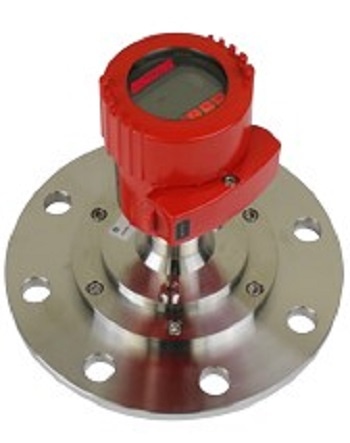Finally, a radar that really excels in solids!

The new BinMaster NCR-80 non-contact radar level sensor is designed specifically for superior performance in powders and bulk solids. Its advanced technology uses a powerful 80 GHz frequency that focuses the signal in a narrow 4° beam angle for precise aiming to avoid the flow stream, internal structure, or sidewall buildup. This ensures reliability at measuring ranges up to 393 feet and accuracy within 0.2 inches. The NCR-80 is ideal for continuous level measurement in tall and narrow vessels where there is excessive noise or dust. It features CSA/FM Intrinsically Safe Class I, II, III, Division 1, Groups A, B, C, D, E, F, and G approvals making it suitable for use in hazardous locations.
There are two configurations of the NCR-80, one with a stainless steel swivel flange and the other with a plastic antenna. Setup is simple and intuitive using the optional BinDisc push-button interface enclosed in the housing. The NCR-80 has a fast update rate, is resistant to interference, and automatically eliminates false echoes for reliable performance. Its flat face and sealed antenna system defies damage or dust buildup, and make it virtually maintenance free. It is chemical resistant for tough applications and has optional FDA approval suitable for food and pharmaceutical use.
Just imagine what the 80 GHz radar can do in industries like cement, grain, power, wood chips, pellets, sand, aggregates, or plastics. Due to the narrow beam and 393 foot measurement range, the NCR-80 excels in very tall, narrow silos. Plus, it is up to challenging applications with excessive noise, dust, or high temperatures. Unlike some technologies, it can be used in materials with a dielectric as low as 1.2 or materials with limited reflectivity. It is flexible enough to be installed in warehouses or over conveyor belts to prevent overloading or detect when belts are running empty. With its narrow beam, it also can measure levels within equipment, such as crushers or ESP hoppers, to monitor filling and emptying cycles.
BinMaster is an ISO 9001:2008 certified US manufacturer of point and continuous level indicators and inventory management systems used for monitoring the level of bulk solids or liquids in bins, tanks, silos and hoppers. Material management solutions include all-digital grain monitoring systems, flow detection sensors, and complete solutions using wireless devices & web applications to send data to a control room, console, SmartPhone, tablet, or PC. Robust, custom systems can be developed for a single site or networked for every bin, tank, and silo across a multi-national operation. For more information about BinMaster, visit www.binmaster.com.